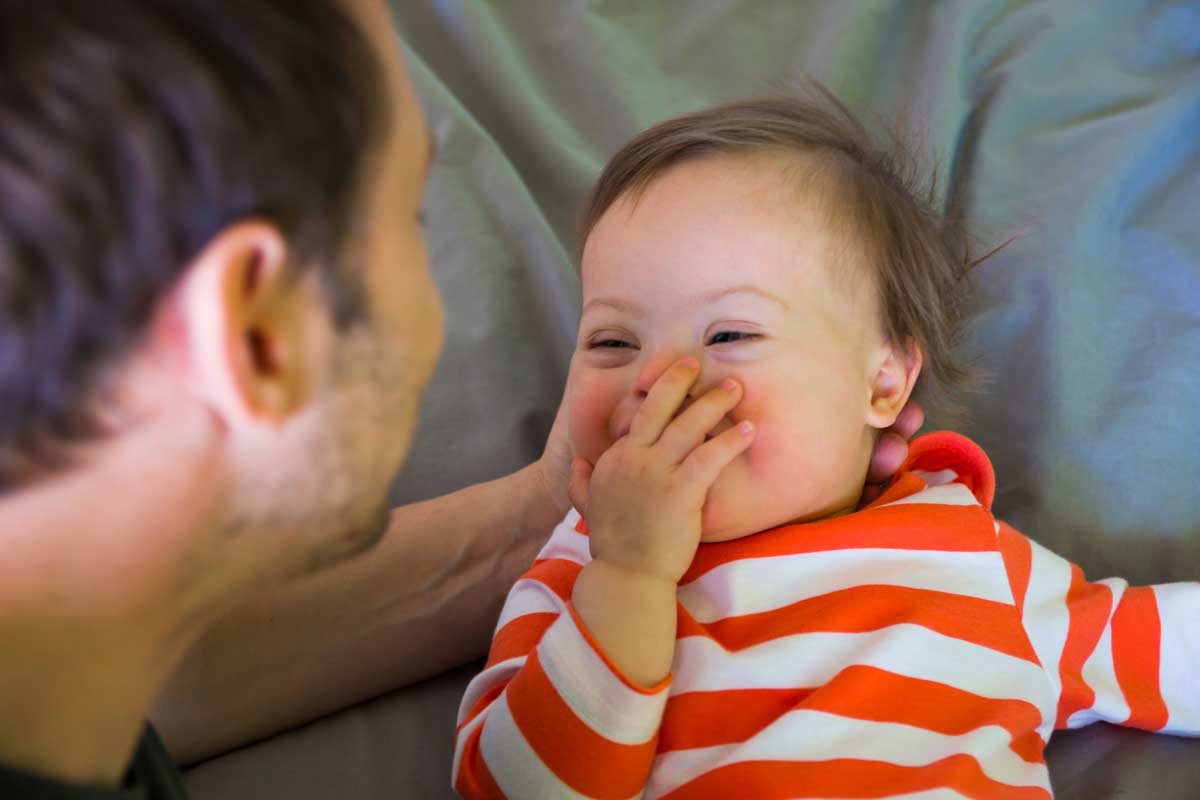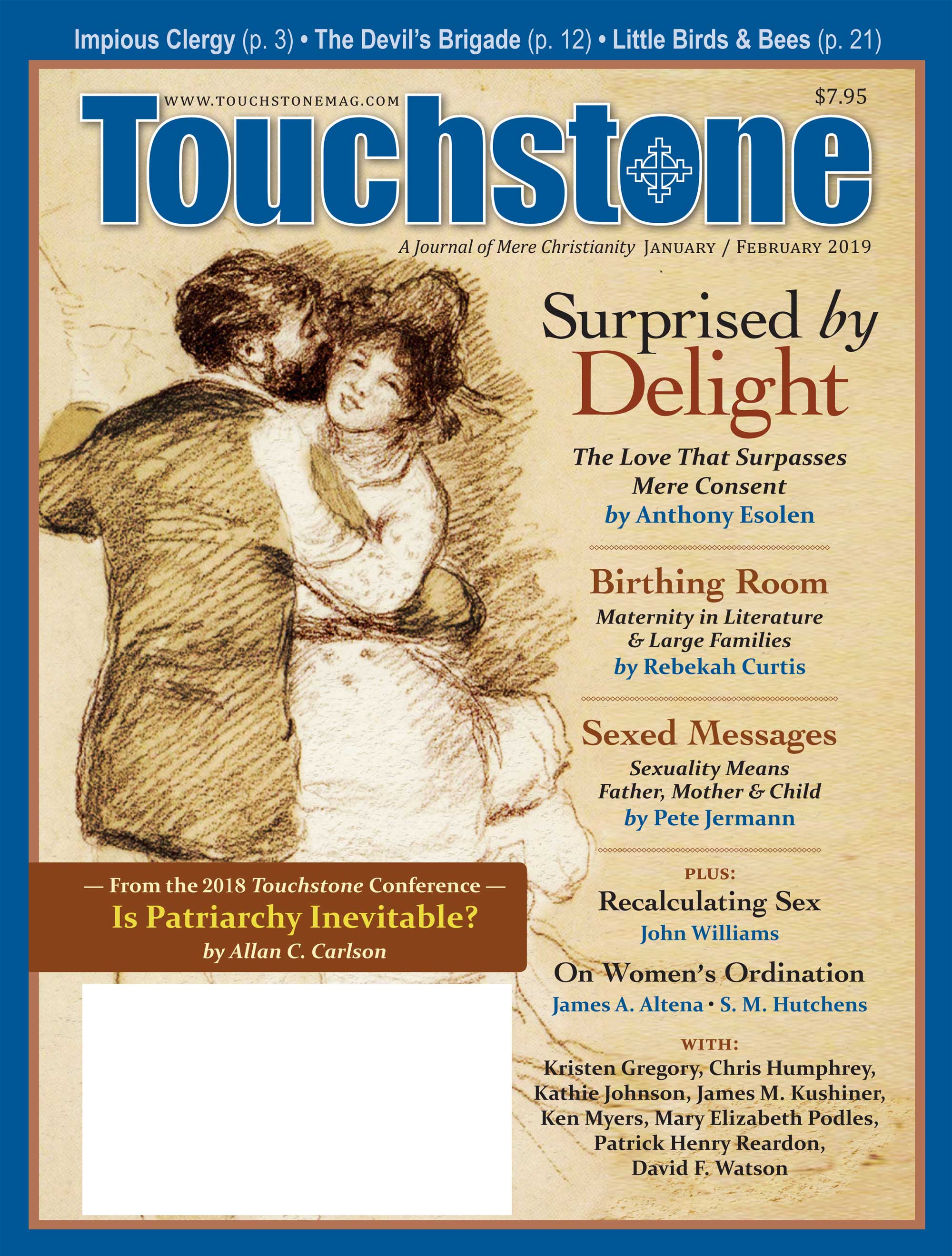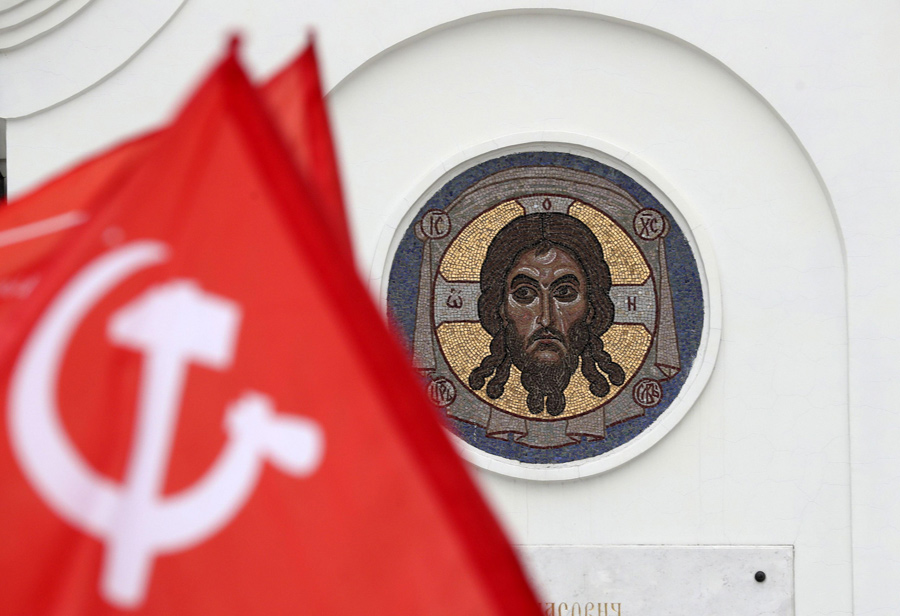View
The Life of Sean
David F. Watson on Down Syndrome & the Lives That Matter
As I watch my eleven-year-old son, Sean, make movies on his iPad, I worry about the future. In this era in which many have taken it upon themselves to insist loudly and publicly that their lives matter, many also insist that lives like Sean's do not. Last March, the Washington Post published an article by Ruth Marcus entitled "I would've aborted a fetus with Down syndrome. Women need that right." As a thought experiment, replace the words "with Down syndrome" with terms for other categories of people. Substitute a particular racial group, gender category, or sexual orientation. The hue and cry over such an article would rattle the heavens. Western culture has developed a normally unspoken hierarchy of humanity, and people with diminished intellectual capacities are on the low end of it.
One might object that categories of race, gender, and sexual orientation do not carry with them the familial and social burdens that people with Down syndrome do. This assumes that "burden" is an appropriate criterion for abortion, an assumption I reject. For the sake of argument, however, let's grant the validity of this position for a moment. At what point, then, do we decide that the level of "burden" justifies the elimination of an entire category of people?
If you would prefer a closer analogy than that of race, gender, or sexual orientation, replace "Down syndrome" in the headline with another genetic condition, like a predisposition to obesity. "I would've aborted a fetus with a genetic propensity to become obese. Women need that right." Think of the strain that obese people place on our healthcare system. If we could only eliminate such people before they were born. . . . Or how about: "I would have aborted a fetus with a genetic predisposition toward depression." Or "alcoholism." Or "Alzheimer's." Or "autism." It is now possible to administer a highly accurate prenatal test for Down syndrome. No doubt the medical community will in time develop tests for other conditions as well. Imagine the headlines our children will read twenty years from now.
To its credit, the Post did publish an opposing opinion by George Will called "The real Down syndrome problem: Accepting genocide." Will defines genocide as "the deliberate, systematic attempt to erase a category of people." Consider also the eugenic character of efforts to eradicate people with Down syndrome. We are witnessing a concerted attempt to eliminate an entire category of people precisely because these people bear genetic characteristics considered undesirable. This has, by and large, already happened in Iceland, and it is happening in other parts of Western Europe and the United States. People with Down syndrome are depicted as inflicting a burden on both their families and the wider society. Therefore, this line of thought goes, their elimination makes life easier for all of us. One wonders which group of undesirables will next bear the unfortunate label of "burden."
Conferring Value on Lives
Do not miss the significance of an article making the case for eugenics appearing in the Washington Post. It is now entirely acceptable to depict people like Sean as superfluous both to families and to society. These people are commonly understood to matter less than other people. Let's be clear about what is happening here: the devaluing of a certain category of people because of a disability. That is the very definition of ableism. To suggest, then, that it is appropriate to eliminate this category of people in the womb is nothing less than to advocate eugenics. Why is this not considered hate speech? In a world where college students have to run to their safe spaces when a tenured professor opts not to use their preferred pronouns, how is it acceptable to advocate ableist, eugenic policies in an established forum such as the Washington Post?
The reason is that, culturally speaking, we determine the value of certain categories of people by the effectiveness of those who advocate on their behalf. In Western culture, the church has lost a great deal of its once-pervasive influence. Some people—many, in fact—insist that this is a good thing. We have finally thrown off the puritanical shackles of Christianity and entered into a new era of individual freedom. This, however, is a lie. We are no freer than we were before. We have simply decided to serve different masters.
We have entered into an era in which we have to insist that various categories of lives actually matter. The Black Lives Matter movement has given rise to other advocacy groups. We are now reminded that blue lives, brown lives, and gay lives matter. In response to these various slogans, some people have begun to insist that "all lives matter." But do they? The emergence of these advocacy movements suggests that any widespread cultural notion that human life is intrinsically valuable has vanished. We now establish the value of lives through the will to power. Nietzschean voluntarism has replaced philosophical and theological notions of the intrinsic value of human life.
In this world, people with Down syndrome are at a significant disadvantage. Because they normally experience diminished intellectual capacity compared to "typical" people, it is very difficult for them to enter into the arenas of advocacy and public discourse. The will to power is not within their grasp. We might expect their parents to advocate on their behalf, and some do, but the abortion rate of children with Down syndrome indicates that their parents are often the very ones from whom they need protection.
The Need for Clarity
I am not surprised to see the rise of ethical voluntarism in secular cultures. It is a logical outworking of the epistemic consequence of sin. Under the influence of original sin, people replace the values disclosed to us through divine revelation with values they believe serve their own interests. What frightens me, however, is seeing these values penetrate the church. They have established innumerable outposts within mainline Protestantism, and they are increasingly infiltrating Western Evangelicalism.
I spend considerable time in various communities of the Protestant world: mainline, Evangelical, charismatic, and African-American. When faced with complex ethical issues, Protestants stand at a significant disadvantage relative to Roman Catholics. We tend to make ethical decisions based upon emotivism, biblicism, or some combination of the two. What many Protestant traditions lack is a well-thought-out body of doctrinal and ethical resources rooted in Scripture, but drawing out its implications in disciplined and systematic ways that can help to shape the life of the church. We need more than feelings about the value of life and Scripture passages that support our feelings.
We need more than the writings of theologians and ethicists whose work remains peripheral to the church's decision-making processes. We need real doctrinal clarity that can give rise to ethical clarity. In the case of the lives of people with Down syndrome, we need theological anthropology. Without clear, reasoned teaching from the church, many of our congregants will simply adopt the values of the dominant culture in which they live.
Reinders's Insights
One of the finest pieces of theology I have ever read is Receiving the Gift of Friendship: Profound Disability, Theological Anthropology, and Ethics, by Hans S. Reinders (-Eerdmans, 2008). This work is not simply an outstanding example of the theology of disability, but it could also serve as a model for many other areas of theological inquiry. In the book, Reinders takes up the matter of "profound disability," by which he means a "state of mental development that has not gone beyond a toddler's stage of development" (48). Reinders asserts that "being created in God's image indicates a unique relationship" and that "this relationship is affirmed extrinsically by the triune God. . . . From a Christian point of view, all of this is to say that the human being exists truthfully in God's friendship, regardless of his or her abilities and disabilities" (313).
When we become friends with people with profound disabilities, we are acting in agreement with God's friendship with them. In the process, we ourselves are changed. We learn about what it means to be truly human. People with profound disabilities teach us about our own -friendship with God. They show us that "being accepted by God does not depend on our goodness" (320). They show us that, as we age and lose some of the capacities in which we have been taught to take so much pride, our value as human beings is not diminished. In other words, Reinders constructs a theological vantage point from which it is impossible to distinguish differences in value among people with various levels of abilities.
Put differently, in Reinders's schema, the value of human life is not based on what a person can accomplish on the one hand, or on how much of a "burden" he or she may be on the other. The value of human life is based in God's love. When we come into agreement with God's love, we will understand the value of all human life, regardless of disability or any other category we wish to consider. The church must continue to insist that human life has value that is independent of an individual's ability and power. We must resist the lure of voluntarism. We must be ever vigilant to make sure that our own values are not simply the values of the wider culture with Christian window dressing.
Picking Up Our Game
Particularly among Protestants, this means that we need to pick up our game. We need to take more seriously the theological teaching office of the church, and to help our congregants understand why each human life matters. The people in our churches don't simply need to know that one human life matters as much as any other; they also need to know why this is the case. If we do not intentionally shape them intellectually and ethically, someone else will.
In her Post article, Ruth Marcus provides us with a moment of exquisite irony when she describes legal efforts to prevent eugenic selection against people with Down syndrome with this comparison: "In an argument worthy of 'The Handmaid's Tale'. . . ." Marcus evokes the specter of a fictitious dystopia for women when she herself is contributing to a real-life dystopia for people with Down syndrome.
Indeed, as I watch Sean make movies on his iPad, I worry about the future. I worry about his future, not because of his level of ability, but because of the voices of those who will say that his life matters less than others'. I pray that the Body of Christ will stand up for him, and those like him, in a world that sees them as burdens rather than gifts.
David F. Watson serves as Academic Dean and Professor of New Testament at United Theological Seminary in Dayton, Ohio. His most recent book is Scripture and the Life of God: Why the Bible Matters Today More Than Ever (Seedbed, 2017), and he blogs at www.davidfwatson.me. David and his wife, Harriet, have two children, Luke and Sean.
subscription options
Order
Print/Online Subscription

Get six issues (one year) of Touchstone PLUS full online access including pdf downloads for only $39.95. That's only $3.34 per month!
Order
Online Only
Subscription

Get a one-year full-access subscription to the Touchstone online archives for only $19.95. That's only $1.66 per month!
bulk subscriptions
Order Touchstone subscriptions in bulk and save $10 per sub! Each subscription includes 6 issues of Touchstone plus full online access to touchstonemag.com—including archives, videos, and pdf downloads of recent issues for only $29.95 each! Great for churches or study groups.
Transactions will be processed on a secure server.
more on family from the online archives
more from the online archives
calling all readers
Please Donate
"There are magazines worth reading but few worth saving . . . Touchstone is just such a magazine."
—Alice von Hildebrand
"Here we do not concede one square millimeter of territory to falsehood, folly, contemporary sentimentality, or fashion. We speak the truth, and let God be our judge. . . . Touchstone is the one committedly Christian conservative journal."
—Anthony Esolen, Touchstone senior editor












